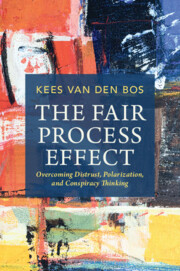Refine search
Actions for selected content:
5 results
1 - Understanding How Campaigns Matter
-
- Book:
- Choices in a Chaotic Campaign
- Published online:
- 16 May 2024
- Print publication:
- 23 May 2024, pp 1-36
-
- Chapter
- Export citation
Chapter 8 - Conspiracy Thinking
- from Part IV - Examining Societal Discontent
-
- Book:
- The Fair Process Effect
- Published online:
- 26 October 2023
- Print publication:
- 09 November 2023, pp 89-102
-
- Chapter
- Export citation

The Fair Process Effect
- Overcoming Distrust, Polarization, and Conspiracy Thinking
-
- Published online:
- 26 October 2023
- Print publication:
- 09 November 2023
Belief in false information regarding the COVID-19 pandemic and a tendency to conspiracy thinking as factors that may exacerbate symptoms of anxiety and depression among Polish citizens
-
- Journal:
- European Psychiatry / Volume 65 / Issue S1 / June 2022
- Published online by Cambridge University Press:
- 01 September 2022, p. S75
-
- Article
-
- You have access
- Open access
- Export citation
Public Opinions and Conspiracy Thinking Toward the COVID-19 Outbreak in Iraqi Kurdistan
-
- Journal:
- Disaster Medicine and Public Health Preparedness / Volume 16 / Issue 4 / August 2022
- Published online by Cambridge University Press:
- 22 December 2020, pp. 1322-1325
-
- Article
-
- You have access
- Open access
- HTML
- Export citation
